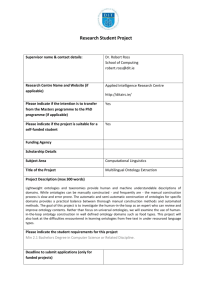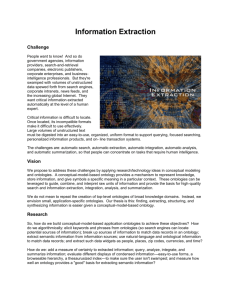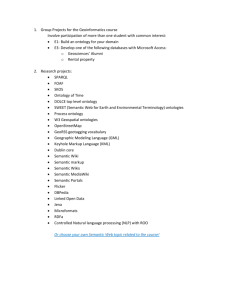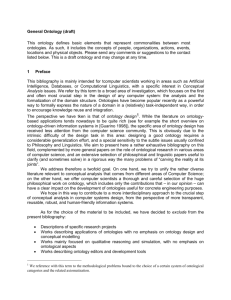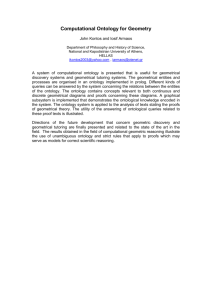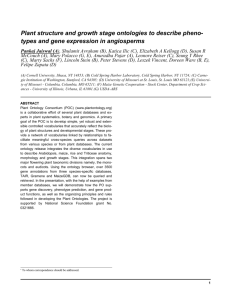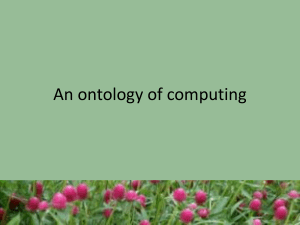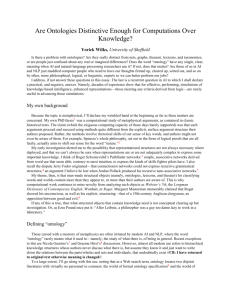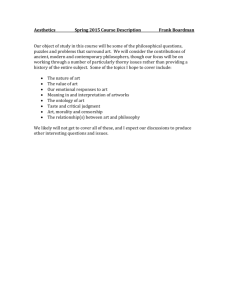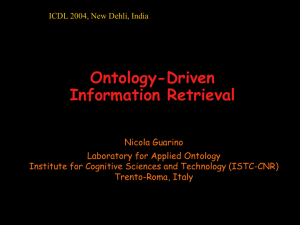Short Summary of a European Science Foundation
advertisement
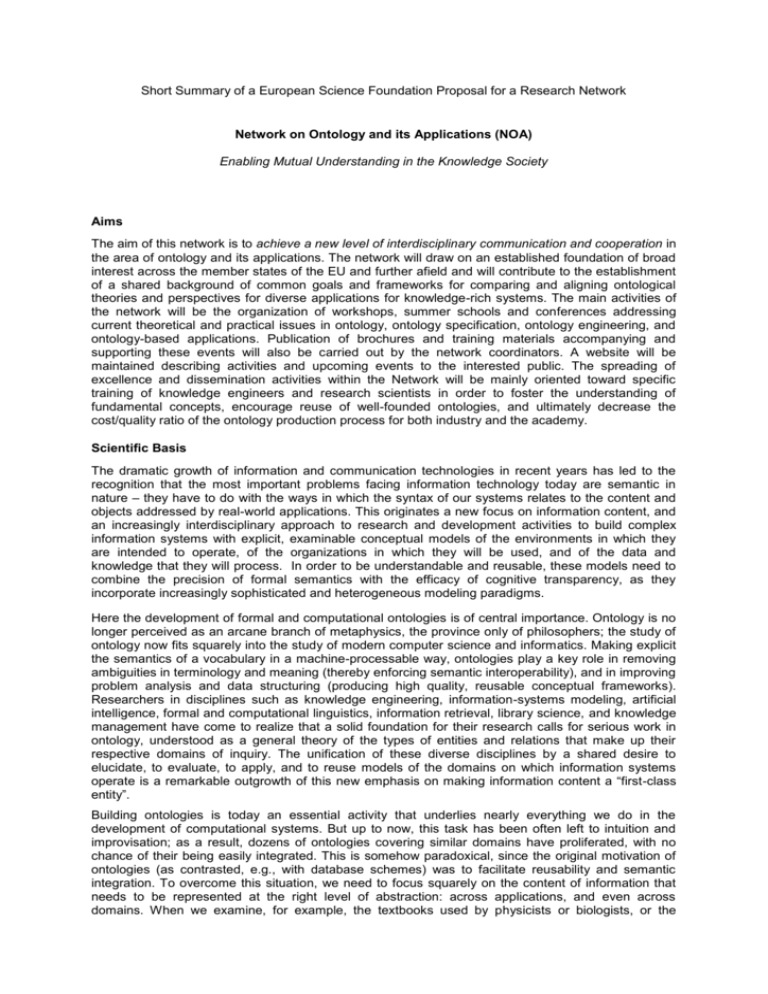
Short Summary of a European Science Foundation Proposal for a Research Network Network on Ontology and its Applications (NOA) Enabling Mutual Understanding in the Knowledge Society Aims The aim of this network is to achieve a new level of interdisciplinary communication and cooperation in the area of ontology and its applications. The network will draw on an established foundation of broad interest across the member states of the EU and further afield and will contribute to the establishment of a shared background of common goals and frameworks for comparing and aligning ontological theories and perspectives for diverse applications for knowledge-rich systems. The main activities of the network will be the organization of workshops, summer schools and conferences addressing current theoretical and practical issues in ontology, ontology specification, ontology engineering, and ontology-based applications. Publication of brochures and training materials accompanying and supporting these events will also be carried out by the network coordinators. A website will be maintained describing activities and upcoming events to the interested public. The spreading of excellence and dissemination activities within the Network will be mainly oriented toward specific training of knowledge engineers and research scientists in order to foster the understanding of fundamental concepts, encourage reuse of well-founded ontologies, and ultimately decrease the cost/quality ratio of the ontology production process for both industry and the academy. Scientific Basis The dramatic growth of information and communication technologies in recent years has led to the recognition that the most important problems facing information technology today are semantic in nature – they have to do with the ways in which the syntax of our systems relates to the content and objects addressed by real-world applications. This originates a new focus on information content, and an increasingly interdisciplinary approach to research and development activities to build complex information systems with explicit, examinable conceptual models of the environments in which they are intended to operate, of the organizations in which they will be used, and of the data and knowledge that they will process. In order to be understandable and reusable, these models need to combine the precision of formal semantics with the efficacy of cognitive transparency, as they incorporate increasingly sophisticated and heterogeneous modeling paradigms. Here the development of formal and computational ontologies is of central importance. Ontology is no longer perceived as an arcane branch of metaphysics, the province only of philosophers; the study of ontology now fits squarely into the study of modern computer science and informatics. Making explicit the semantics of a vocabulary in a machine-processable way, ontologies play a key role in removing ambiguities in terminology and meaning (thereby enforcing semantic interoperability), and in improving problem analysis and data structuring (producing high quality, reusable conceptual frameworks). Researchers in disciplines such as knowledge engineering, information-systems modeling, artificial intelligence, formal and computational linguistics, information retrieval, library science, and knowledge management have come to realize that a solid foundation for their research calls for serious work in ontology, understood as a general theory of the types of entities and relations that make up their respective domains of inquiry. The unification of these diverse disciplines by a shared desire to elucidate, to evaluate, to apply, and to reuse models of the domains on which information systems operate is a remarkable outgrowth of this new emphasis on making information content a “first-class entity”. Building ontologies is today an essential activity that underlies nearly everything we do in the development of computational systems. But up to now, this task has been often left to intuition and improvisation; as a result, dozens of ontologies covering similar domains have proliferated, with no chance of their being easily integrated. This is somehow paradoxical, since the original motivation of ontologies (as contrasted, e.g., with database schemes) was to facilitate reusability and semantic integration. To overcome this situation, we need to focus squarely on the content of information that needs to be represented at the right level of abstraction: across applications, and even across domains. When we examine, for example, the textbooks used by physicists or biologists, or the manuals and documentation materials prepared in engineering or commerce, then we encounter over and over again the same fundamental categories and relations – object, function, attribute, quality, part, boundary, system, agent, role, and so forth. The people working in these areas have a perfectly serviceable intuitive understanding of these very general ontological notions. When computers enter the scene, however, then precise formal definitions are critical to the orderly functioning of the information systems which become increasingly required through the need to manage automatically ever larger amounts of data. Providing such ontological analysis is therefore the target of tedious, knowledge engineering efforts. These efforts are expensive, difficult, often performed in a sloppy manner, and with very little guidance from others who have performed the same tasks more successfully in other, similar contexts. All of those involved would therefore benefit considerably from the establishment of an organizational infrastructure within which knowledge on methods, on past experience, and new directions could be shared more easily across national and institutional boundaries. This is the primary goal of the network to be established. Given the role ontologies are playing at this time, the impact of a well structured raft of training programmes and schools in the area building on established European centres of excellence in ontology development and engineering can be expected to be substantial. 1Similar efforts in the US, Japan and elsewhere also document the timeliness of the venture. World-wide dimension In Europe, as well as in the rest of the world, the communities working on ontologies from the point of view of contents are relatively scattered and isolated from each other in comparison to other scientific disciplines. In particular, computer scientists are seldom aware of the contributions coming from the most recent advances in philosophy, cognitive science, or linguistics, whereas researchers in these disciplines, in turn, usually disregard the potential applications of their work to information interoperability and the potential input of more formal modeling techniques. Moreover, within each discipline, different but related scientific approaches tend to evolve independently, with scant attention being given to the reciprocal understanding of systematic connections and comparisons. In order to explicitly work against this isolation, an international association for ontology and its applications (IAOA) has recently been founded and is currently soliciting membership worldwide from all those concerned with ontology development and use. The consortium behind this proposal are all founding members of this association and see the move to a funded European Research Network (open to a global international dimension) as the ideal infrastructure for furthering the promotion of world-class training and research interactions worldwide in the area of ontology. The proposal is submitted by three principal applicants: IRIT, Nathalie Auusenac-Gilles & Laure Vieu (CNRS UMR 5505, France); Istituto di Scienze e Tecnologie della Cognizione, Laboratorio di Ontologia Applicata, Nicola Guarino (CNR, Italy) and University of Bremen, Bremen Ontology Research Group, John Bateman (Germany), and counts on the active support from key players coming from several European countries (including Austria, Belgium, Bulgaria, Denmark, Germany, Greece, Ireland, Italy, The Netherlands, Poland, UK, and possibly more), as well as from US, Canada, Japan, Australia, Brazil, Korea, and various other countries whose participation is being verified. The best research groups involved in this work are now at the point where they have reached the critical mass needed to make a truly strong impact on the current practice of semantic-based research and technology. But to this end, they need to develop in a coordinated fashion a common framework for comparing their positions, developing common theoretical and computational tools, establishing cumulative results as well as hard methods or quality assurance, and disseminating these results, tools and methods in an effective way. It is towards the promotion of interdisciplinary research and international collaboration at the intersection of philosophical ontology, linguistics, logic, cognitive science, and computer science, as well as in the applications of ontological analysis to conceptual modeling, knowledge engineering, knowledge management, information-systems development, library and information science, scientific research, and semantic technologies in general that the present proposal is directed. 1 http://www.iaoa.org/
